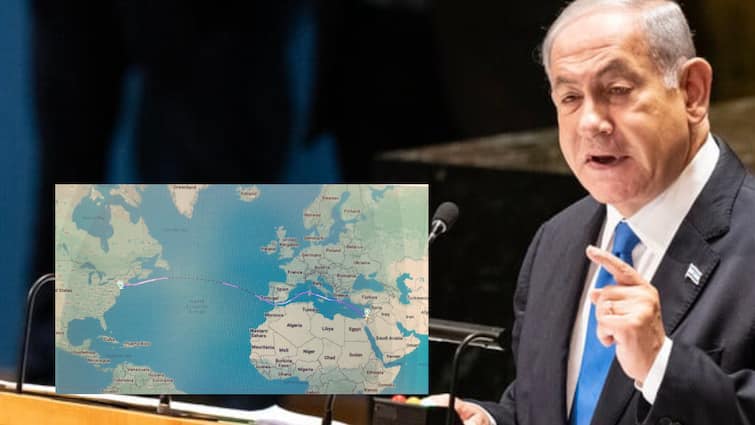Israeli Prime Minister Benjamin Netanyahu took an unusually long and indirect route from Tel Aviv to New York this week, sparking speculation about the influence of international legal pressures on his travels. His destination: the high-stakes United Nations General Assembly session.
Flight tracking data from FlightRadar24 revealed that Netanyahu’s official aircraft avoided major swaths of European airspace on Thursday. Instead of taking the direct path over Europe, the plane skirted the eastern Mediterranean, made a brief pass over Greece and Italy, then swung sharply southwest over the Strait of Gibraltar before heading across the Atlantic. The detour added nearly two and a half hours, turning a standard 10-hour Tel Aviv–JFK flight into almost 13 hours.
Why the Detour?
Israel has not publicly explained the unusual route, but experts suggest it is tied to the increasing diplomatic shadow cast by the International Criminal Court (ICC). In 2024, the ICC issued an arrest warrant against Netanyahu over alleged war crimes committed during Israel’s military operations in Gaza. While Netanyahu has dismissed the charges as “absurd and false,” the warrant has introduced new complications for his international travel.
El avión que ha llevado al primer ministro de Israel, Benjamín Netanyahu a la @ONU_es esquiva Francia y parte de nuestro espacio aéreo por temor a que una incidencia lleve a su detención. VIA: https://t.co/Mm1v2IBC1x pic.twitter.com/mh8R9j3LSl
— Carlos Núñez Sánchez 🌐 (@Freecanusa) September 26, 2025
By avoiding countries that are ICC members, Netanyahu minimized the risk of being forced to land and face arrest. Although the flight did briefly touch Greek and Italian airspace, it intentionally avoided France and Spain, lengthening the journey. CNN reported that France had technically approved the overflight, but Netanyahu’s team opted for caution.
The Diplomatic Context
The rerouting comes amid heightened tensions between Israel and several European nations. Recently, many European countries used the UN General Assembly platform to recognize a Palestinian state, a move Netanyahu strongly opposes. Additionally, Slovenia recently barred Netanyahu from entering the country due to ICC proceedings, following its earlier ban in July on Israeli ministers Bezalel Smotrich and Itamar Ben Gvir over statements deemed incitements to “extreme violence” and violations of Palestinian human rights.
“For some governments, giving Netanyahu permission to fly over their country would be a political liability,” noted Steve Ganyard, a former US State Department official and ABC News contributor.
The extended flight route is a stark reminder of how international law and geopolitics are increasingly shaping even the seemingly routine aspects of global diplomacy—like the skies through which world leaders travel.



